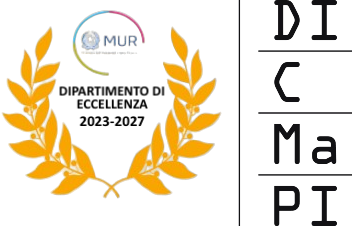The Master’s Degree Course in Industrial Bioengineering belongs to the LM-21 degree class (Biomedical Engineering). The course is entirely taught in English, lasts two years and the achievement of the title requires passing 12 exams, including the final degree exam.
The training path is based on the themes of industrial engineering applied to the biomedical field. In general, the course illustrates and analyzes the information flows that occur between biological and artificial entities. Knowledge of the molecular and biophysical signals underlying this exchange of information is of crucial importance for the design and creation of innovative devices for therapy and diagnostics.
Further information regarding the training path, courses, entry requirements, final exam are reported in the teaching regulations of the Degree Course.
The course is devided into 11 teachings plus the final exam, deliveres in 4 semesters:
1° year 1° semester
- Biochemistry and Cell and Molecular Biology (6+6 ECTS)
- Biomechanics (6 ECTS)
- System analysis for Bioengineering (6 ECTS)
1° year 2° semester
- Thermodynamics of Living Systems and Transport Phenomena in Living Systems (6+6 ECTS)
- Microfluidics for Lab-on-Chip and Systems and Synthetic Biology (6+6 ECTS)
2° year 1° semester
- Diagnostic Devices and Drug Delivery (9 ECTS)
- Biomaterials and Tissue Engineering (6+6 ECTS)
- Mechanics in Tissues and Growth (6 ECTS)
2° year 2° semester
- Computer Interface for Biological Systems and Biomedical Imaging (6+6 ECTS)
- Robotics for Bioengineering (6 ECTS)
- Elective Subjects (6 +6 ECTS)
- Internship (3 CFU)
- Thesis (12 CFU)
Elective Subjects
- Design of Biomimetic Devices (6 ECTS)
- Artificial Organs and Prostheses (6 ECTS)
- Advanced Thermodynamics and Transport Phenomena (6+6 ECTS)
- Fundamentals of Materials for Biomedicine (6 ECTS)
Click HERE to download the Study Plan form in editable PDF version. After completing it, send it to the coordinator.
…



